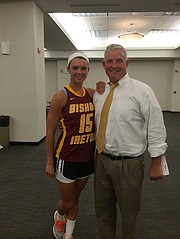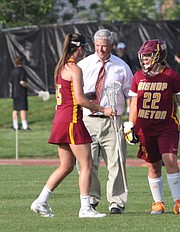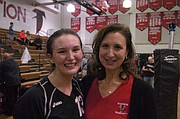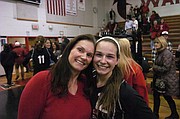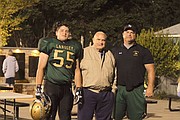Hayfield’s Molly Overstreet, middle, is a two-time VHSL state champion gymnast. Her mother, Kristin Overstreet, right, is an assistant coach with the Hawks. Also pictured is Hayfield head coach Michelle Pennow. Photo contributed
Rick Sofield started coaching when he was in high school, helping his father coach his younger brothers in football. He continued when he was in law school, when he made extra money coaching various middle school and high school sports.
After starting a family with his wife, Alice, Sofield couldn’t wait to coach his own kids. The Sofields’ first child was a girl named Charlotte, who turned out to be quite the athlete.
Sofield, who played four sports in high school on Long Island and four years of football and lacrosse at Harvard University, helped coach Charlotte in peewee soccer and T-ball. When she was in the first grade, Sofield coached Charlotte’s lacrosse team after convincing the commissioner of a Fort Hunt rec league to let Charlotte play against girls several years older.
While eager to succeed, Sofield initially struggled as a youth lacrosse coach.
“I had no idea what I was doing and we got killed in our first game,” Sofield wrote in an email. “Afterward, a mom gave me the rule book and suggested that I read it. We got better after that!”
More than a decade later, Sofield is still coaching Charlotte. In the spring of 2014, the duo led the Bishop Ireton girls' lacrosse team to a historic season of success, including the program’s first WCAC championship and first VISAA state title. The Cardinals ended their 20-win season with their first-ever victory against national power St. Stephen’s & St. Agnes, 9-7, in the state championship game.
Charlotte, then a junior, led Ireton in points with 48 goals and 67 assists.
She was an Under Armour Underclass All-American and WCAC Player of the Year, and later signed to play lacrosse at the University of North Carolina. Sofield was named VISAA Coach of the Year and WCAC co-Coach of the Year.
Bishop Ireton will return the majority of its impact players for Charlotte’s senior season in 2015.
“My dad started coaching me when I was in first grade,” Charlotte wrote. “He hasn't been my only lacrosse coach, but he has been my main coach for as long as I can remember.”
From first grade through high school, Charlotte and her dad experienced ups and downs on and off the field. As several coaches and athletes in the area acknowledged, a parent coaching his or her child can be a difficult, yet rewarding process.
“When my wife, Alice, and I started our family, I couldn't wait for the kids to get old enough to coach,” Sofield wrote. “I have coached all four of our kids in a variety of sports: football, basketball, wrestling, ice hockey, T-Ball, and lacrosse.”
Charlotte was the oldest child, and Sofield admits she was forced to deal with his mistakes as a first time parent/coach, including not being able to separate the two roles.
“The middle school years were particularly tough for me and Char,” Sofield wrote. “I hadn't learned how to separate Dad from Coach. I also saw exceptional talent in Char and felt compelled to try and maximize her ability. She has always wanted to be her best so she didn't need all the extra pushing that I was giving her. Unfortunately for Char, I learned my lessons and made my mistakes on her as our eldest and I have been much more patient and understanding with her three younger brothers.”
Charlotte also acknowledged middle school was a tough time.
“Every practice was a disaster,” she wrote. “But I'm happy he didn’t stop coaching. I would not be the player I am today without him.”
Sofield said his wife helped him realize the need for separation between father and coach.
“By the time Char got to middle school, we used to talk about virtually nothing but lacrosse,” Sofield wrote. “It was around that time that Alice gently, but firmly, reminded me through a series of conversations that there was much more to my relationship with Char off the field than lacrosse. She reminded me to keep lacrosse on the field, and be a father at home.”
Sofield said he still struggles at times differentiating between Charlotte as his daughter and Charlotte as No. 15 on the Bishop Ireton girls’ lacrosse team.
“I've gotten much better over the past 10-plus years in separating player and child,” Sofield wrote. “I'm still not always as good at it as she deserves: I sometimes find myself projecting my own ambitions for her onto her. I'm aware of it now, though, and remind myself (or sometimes she reminds me!) that it's her journey, not mine.”
Keith A. Kaufman, Ph.D., a sport psychologist with offices in Washington, D.C. and Old Town Alexandria, said two potential issues stand out for a young athlete coached by a parent.
“I think two issues that jump out to me are the athlete feels like they can never escape talking about the sport,” Kaufman said in a phone interview, “or they feel too much scrutiny or not enough; like they feel like they’re treated differently [than other members of the team].”
Kaufman said “it’s absolutely essential there are boundaries,” when a parent is coaching his or her child, and it’s important the child is treated in the same manner as his or her teammates. While each case is different, he said the relationship can be beneficial.
“I think in an ideal situation,” Kaufman said, “it can be a great way to connect or to share something, or to feel supported or encouraged or instructed by a parent.”
While the potential for burnout exists, Charlotte said she often talks lacrosse with her father, and that’s not a bad thing. She also said she never views Sofield as just a coach.
“During practices and games, my dad is still my dad,” Charlotte wrote. “He will always be my dad. Sure, he is my coach, and personally I think he is the best coach I've ever had, but he is my dad. On or off the field.
“Having my dad as a coach gives me an edge over other players. I am constantly around the game. And I always have a sounding board to vent my lacrosse problems
“As I said previously, my dad will always be my dad. That includes throughout messed-up drills and poor games. When everyone else goes home and leaves lacrosse on the field, I bring it to the dinner table, to family events, everywhere. Lacrosse isn't just on the field. I have my coach watching over me 24/7.
“Lacrosse is a huge bond for my dad and I. It’s our thing together. Lacrosse is a constant. But it's not a bad thing. It is something that he and I both love.”
When it comes to treating Charlotte the same as others on the team, Sofield said he holds his daughter to a higher standard.
“I encourage our players to ‘play hard and make lots of mistakes. Make mistakes by playing fast and learn from them,’” Sofield wrote. “I find that I'm much more tolerant of the mistakes made by other players than of mistakes that Char makes.”
Sofield isn’t alone.
“I would say most coaches are harder on their own kids than they are on the regular kids,” Madison assistant volleyball coach Christine Zanellato said. “We tend to point out when they mess up more than you would with another kid.”
Zanellato and head coach Carrie Hall each have a daughter on the Madison volleyball team, which was one point away from capturing the VHSL 6A state championship in the fall. Zanellato coached her daughter, Natale, when she was young, but stopped when Natale was in middle school.
Their relationship had some rough spots,
“When I was in [sixth] grade, I hated it,” Natale said. “I would cry most nights. I would cry on the way home [from volleyball]. I was very sensitive. I would get a little upset when she would tell me to suck it up or do this and that. I wasn’t as good with her criticism.”
After a few years playing for other coaches, Natale started to appreciate her mom’s volleyball knowledge. Zanellato played collegiately at LSU and coached the Fairfax High varsity from 2007-2011. When it came time for high school, Natale, who attended Lake Braddock as a freshman, wanted her mom as a coach. Zanellato joined the Bruins’ staff as an assistant in 2012.
“I think what has worked out well for us is that we have a really solid relationship and she trusts that when I am working to improve her skills, I’m looking at her as an athlete,” Zanellato said. “My criticism is all based on what she needs to do on the court. It’s not about her personally. I think that’s the hardest thing [about being a parent/coach] is kids sometimes personalize the comments. ...
“I coached her early and then I stopped. I stepped away and let her be coached by a lot of other people ... then I let her come to me. When she was ready and comfortable, she started seeking me out for, ‘Do I need this?’ ‘How does this work? ‘Does my approach look right?’ ‘Am I blocking too far in?’”
Natale would later transfer to Madison. After not playing high school volleyball her sophomore year, Natale joined the Warhawk varsity as a junior and was a key contributor at outside hitter for the 2014 state runners-up.
“I love working with my mom,” Natale said. “I respect her. I know that she played great. She’s a great coach. When I was younger, it was a little rougher. I was just like, ‘I don’t want to listen to you,’ that kind of stuff. I respect her judgment and I respect what she’s saying. I really respect her opinion. I love having her on the coaching staff.”
Hall said she treats her daughter, Kendal, a standout junior setter for the Warhawks, no differently than any other member of the team.
“It’s not hard to me at all,” Hall said. “I’ve been here 14 years and to me it’s about the program. ... It’s the program first, then my daughter.”
Hall said the two talk about volleyball at home, but don’t discuss strategy.
“We talk about if we think we had a good game or not that night, but nothing too elaborate,” Hall said. “... That way she’s part of the team, I’m part of the coaching staff. She doesn’t need to know anything that’s going on.”
Kendal said she’s appreciative of her mom’s volleyball knowledge.
“It’s definitely nice,” Kendal said, “coming home and having someone to talk to who definitely knows what they’re doing.”
Langley football coach John Howerton started his sons on a path toward gridiron success at a young age. Jack, now a sophomore at Stetson University in DeLand, Fla., and Tyler, now a sophomore at Langley, started strength and skill training before the age of 10. However, they did not play organized football until high school.
Howerton, who was inducted into the Shepherd University athletic Hall of Fame after garnering All-American status as an offensive tackle, taught his sons the basic fundamentals of offensive line play, such as getting in a proper stance. He also showed them the basics of strength training, including 15-minute workouts with a lightweight aluminum pipe.
Between the ages of 10 and 12, Howerton “started to get a little more serious with it.” By the time Jack and Tyler reached high school, they were light years ahead of the other kids in both strength and technique.
Jack earned all-state honors during his time at Langley. He could bench press 500 pounds and squat 675. He is now an offensive lineman at Stetson. Tyler recently completed his sophomore season as a starter on the Langley varsity. Both played right guard for the Saxons.
Howerton said he has tried to treat Jack and Tyler in an equal fashion to other players on the team, but admits he has higher expectations for his sons.
“I try to treat them as any kid out there,” Howerton said. “As a parent, you probably have more expectations for your own sons. I try not to yell at them any more or less than anyone else. I do expect them to excel as much as possible because they’ve been exposed to me as a coach more than the other kids have. ...
“I was probably a little tougher on Jack because he was the first one and we were trying to set the tone of how you’re going to do things. As you learn, the second one is not quite a mystery because you’ve already been through it.”
Howerton was coached by his father, Elton “Cig” Howerton, in youth football. Cig Howerton was an All-American at Randolph-Macon and was inducted into the university’s athletic Hall of Fame.
Tyler said he questioned the purpose of the drills and hard work his father put him through at a young age.
“Even now, I still question that sometimes,” Tyler said. “You have to realize that this is the best for me, this is the best way to go [and] this will make me the best I can be.”
While it’s not easy having his father as a coach, Tyler said there are benefits.
“He’s also able to work with me more than anybody else in the weight room and on the field,” Tyler said. “He’s able to tell me what I’m doing well, what I’m not doing so well. He always has that urge to make me better than everybody else.”
Hayfield assistant gymnastics coach Kristin Overstreet started coaching her daughter, Molly, at a young age, as well, but it didn’t take long for Molly to surpass her mother’s teachings.
“I also coached Molly when she was Level 3 at Cardinal Gymnastics,” Overstreet said. “She quickly surpassed my coaching abilities and moved up through the Level system in club gymnastics and became a Level 9.”
Molly gave up club gymnastics prior to her sophomore year, but still competes at the high school level for Hayfield. Now a junior, Molly has already captured a pair of state championships, finishing in a three-way tie for first on vault as a freshman, and setting a state record on bars as a sophomore.
At the high school level, Molly rarely needs coaching help, allowing Overstreet to focus her attention on the team’s less-experienced gymnasts.
“Molly is so knowledgeable that she can coach herself,” Overstreet wrote in an email. “She knows the corrections she needs to make. I just remind her to have fun and do her best. She is also a great coach to the younger/newer girls. She demonstrates skills and gives them cues for making skills easier for them.
“I love working with the Hayfield girls. We have nine girls who have never competed in gymnastics before and they improve daily. They usually need my time at practice more than Molly does, but I am always watching her out of the corner of my eye. I rarely have to set limits on her. She knows what is expected and she does it.”
Molly struggles with back pain “from years of overuse, training up to 25 hours a week and the constant pounding and hard landing,” her mother wrote. The pain is to the point that Molly might have to walk away from gymnastics this year, according to Overstreet.
Molly said one of the greatest benefits of having her mom as a coach is when it comes to dealing with pain.
“Some benefits for having my mom as a coach are that she knows me the best, so when I'm in pain or anything like that, she can tell,” Molly wrote. “My mom is a very understanding person and her being my mom and coach, it makes it that much easier to communicate with her about what's going on, or if I don't want to do something.”
Like others in the same situation, Molly and her mother experience stressful times together. However, Overstreet, who used to coach at Edison and coached her two other daughters, as well, said coaching her child has benefits.
“Special time together, great memories, great pictures, laughing together,” Overstreet wrote about coaching benefits. “... Helping them to get the most out of what they enjoy. Just being able to teach them, being a positive role model [and] helping them to be successful.”

